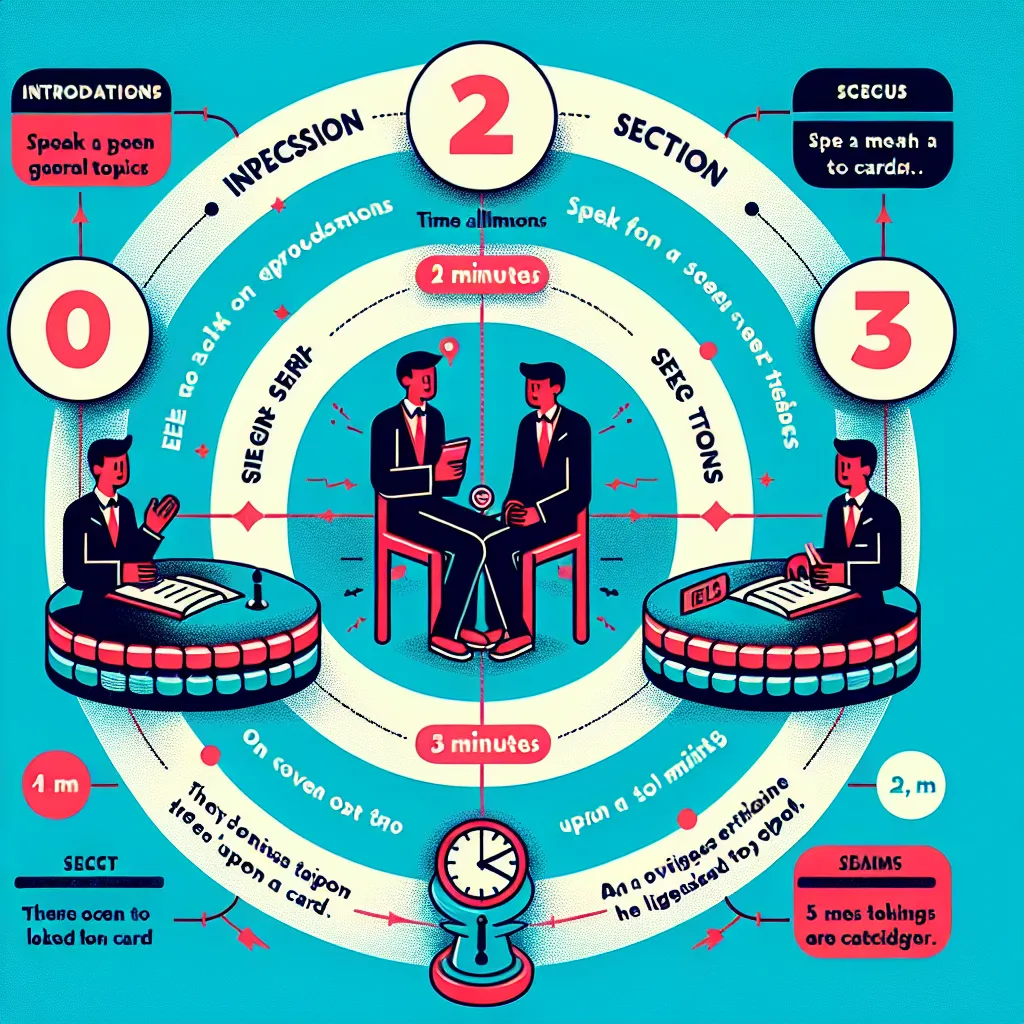Are you preparing for the IELTS Speaking test and wondering what to expect? This comprehensive guide will walk you through the entire process of how the IELTS Speaking test is conducted, providing valuable insights and tips to help you succeed.
Understanding the IELTS Speaking Test Format
The IELTS Speaking test is a face-to-face interview with a certified IELTS examiner. It is designed to assess your ability to communicate effectively in English. The test is divided into three parts and lasts for approximately 11-14 minutes.
 IELTS Speaking Test Overview
IELTS Speaking Test Overview
Part 1: Introduction and Interview (4-5 minutes)
In this section, the examiner will introduce themselves and ask you to confirm your identity. They will then ask you general questions about familiar topics such as:
- Your home/work
- Your family
- Your hobbies
- Your studies
The purpose of this part is to help you relax and get comfortable speaking English. It’s important to provide detailed answers and maintain a natural conversation flow.
Part 2: Individual Long Turn (3-4 minutes)
For this part, you’ll be given a task card with a topic and some prompts. You’ll have one minute to prepare your response, and then you’ll need to speak for 1-2 minutes on the given topic. Topics can range from describing a person, place, or object to talking about an experience or event.
Remember to use your preparation time wisely:
- Read the task card carefully
- Make brief notes
- Organize your thoughts
After your long turn, the examiner may ask one or two follow-up questions related to the topic.
Part 3: Two-Way Discussion (4-5 minutes)
The final part of the test involves a more in-depth discussion related to the topic from Part 2. The examiner will ask you questions that require you to express and justify opinions, analyze ideas, and discuss abstract concepts.
This section assesses your ability to:
- Express complex ideas
- Support your opinions
- Discuss hypothetical situations
The Role of the IELTS Examiner
The IELTS examiner plays a crucial role in conducting the Speaking test. Here’s what you need to know about their role:
-
Facilitation: The examiner guides you through the test, ensuring you understand each task.
-
Assessment: They evaluate your performance based on four criteria:
- Fluency and Coherence
- Lexical Resource
- Grammatical Range and Accuracy
- Pronunciation
-
Neutrality: Examiners maintain a neutral demeanor and do not provide feedback during the test.
Important Tips for Success
To perform well in the IELTS Speaking test, consider the following tips:
- Speak naturally and confidently
- Use a variety of vocabulary and grammatical structures
- Provide detailed answers with examples
- Stay on topic and avoid memorized responses
- Ask for clarification if you don’t understand a question
- Practice good time management, especially in Part 2
 IELTS Speaking Test Tips
IELTS Speaking Test Tips
Common Challenges and How to Overcome Them
Many test-takers face certain challenges during the IELTS Speaking test. Here are some common issues and strategies to address them:
-
Nervousness: Practice deep breathing and remember that the examiner is there to help you showcase your English skills.
-
Limited vocabulary: Expand your vocabulary by reading widely and learning synonyms for common words.
-
Lack of ideas: Stay informed about current events and practice expressing opinions on various topics.
-
Time management: Use practice tests to get a feel for the timing of each part.
-
Pronunciation difficulties: Focus on stress, intonation, and clear articulation. Listen to native speakers and practice mimicking their speech patterns.
Preparation Strategies
To effectively prepare for the IELTS Speaking test:
- Practice regularly with a study partner or language exchange app
- Record yourself speaking and analyze your performance
- Watch English-language media to improve your listening and speaking skills
- Take mock tests to familiarize yourself with the format and timing
- Learn common IELTS Speaking topics and practice discussing them
What Happens on Test Day?
On the day of your IELTS Speaking test:
- Arrive early at the test center
- Bring your identification documents
- Wait in the designated area until you’re called for your test
- Enter the test room and greet the examiner professionally
- Remember to speak clearly and confidently throughout the test
Conclusion
Understanding how the IELTS Speaking test is conducted is crucial for your success. By familiarizing yourself with the format, preparing thoroughly, and following the tips provided in this guide, you’ll be well-equipped to showcase your English speaking skills and achieve your desired score.
Remember, the key to success in the IELTS Speaking test is practice and confidence. Keep working on your English skills, stay informed about various topics, and approach the test with a positive attitude. Good luck with your IELTS journey!
[internal_links]
- 10 Essential IELTS Speaking Strategies
- How to Improve Your IELTS Speaking Score
- Common IELTS Speaking Topics and Sample Answers
[/internal_links]




